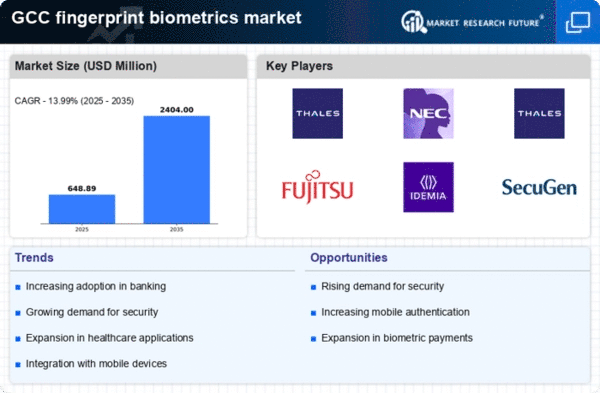Rising Security Concerns
The fingerprint biometrics market is experiencing a surge in demand due to escalating security concerns across various sectors in the GCC. Organizations are increasingly recognizing the vulnerabilities associated with traditional authentication methods, such as passwords and PINs. As cyber threats evolve, the need for robust security measures becomes paramount. The fingerprint biometrics market is projected to grow at a CAGR of approximately 20% from 2025 to 2030, driven by the necessity for enhanced security protocols. This trend is particularly evident in sectors like banking, healthcare, and government, where sensitive data protection is critical. The integration of fingerprint biometrics into security systems not only mitigates risks but also streamlines access control, thereby fostering a safer environment for both businesses and consumers.
Technological Advancements
Technological advancements play a pivotal role in shaping the fingerprint biometrics market. Innovations in sensor technology, algorithms, and data processing capabilities have significantly improved the accuracy and speed of fingerprint recognition systems. In the GCC, the introduction of advanced fingerprint scanners with high-resolution imaging and multi-spectral sensing is enhancing user experience and security. The market is expected to witness a substantial increase in adoption rates, with estimates suggesting a growth of around 25% in the next five years. These advancements not only bolster security measures but also facilitate seamless integration with existing systems, making fingerprint biometrics a preferred choice for various applications, including access control and identity verification.
Growing Demand in Healthcare
The healthcare sector is witnessing a growing demand for fingerprint biometrics, significantly impacting the fingerprint biometrics market. Hospitals and clinics in the GCC are adopting biometric solutions to streamline patient identification and enhance data security. The need for accurate patient records and secure access to sensitive information is driving this trend. It is estimated that the healthcare segment will account for approximately 30% of the total market share by 2026. By utilizing fingerprint biometrics, healthcare providers can reduce the risk of identity fraud and ensure that patients receive the correct treatments. This trend reflects a broader movement towards digitization and improved operational efficiency within the healthcare industry.
Increased Consumer Awareness
Increased consumer awareness regarding the benefits of biometric authentication is significantly influencing the fingerprint biometrics market. As individuals become more informed about the limitations of traditional security measures, there is a growing preference for biometric solutions that offer enhanced security and convenience. This shift in consumer behavior is particularly evident in the GCC, where the adoption of fingerprint biometrics in personal devices, such as smartphones and laptops, is on the rise. Market analysts project that consumer adoption rates will increase by approximately 15% annually over the next five years. This heightened awareness not only drives demand for fingerprint biometrics but also encourages manufacturers to innovate and improve their offerings.
Government Initiatives and Investments
Government initiatives and investments in biometric technologies are driving the growth of the fingerprint biometrics market in the GCC. Several countries in the region are implementing national identification programs that leverage biometric solutions for enhanced security and efficiency. For instance, initiatives aimed at digitizing public services and improving border control are increasingly incorporating fingerprint biometrics. The market was projected to reach a valuation of $1 billion by 2027, fueled by these government-led projects. Such investments not only enhance national security but also promote the adoption of biometric technologies across various sectors, including law enforcement and immigration.
















